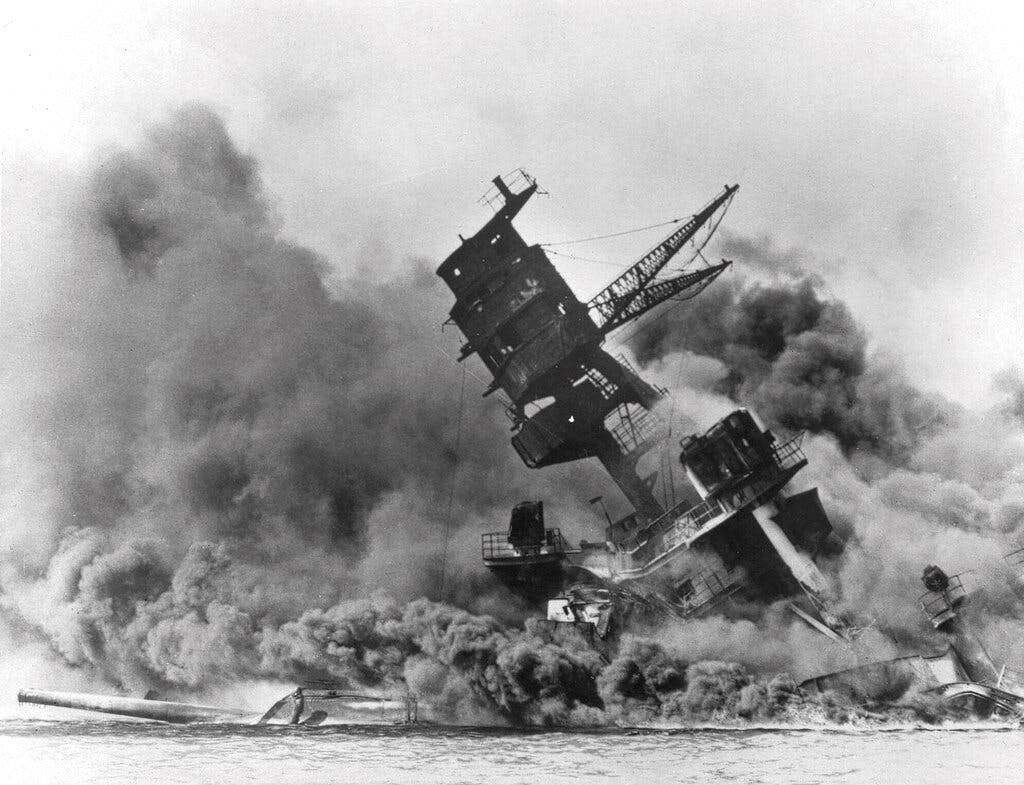The Whispered Warning of One of the Last Men To Have Survived Pearl Harbor
‘Weakness invites aggression,’ Lieutenant Jim Downing, then 103, told me personally.

As America marks the 81st anniversary of the Japanese Empire bombing Pearl Harbor, a threat from Communist China looms on the Pacific horizon. So it’s a fitting moment to hear the voices of our 2,390 military and civilian dead in that catastrophe, reminding us that words alone cannot safeguard our liberty.
In 2016, I interviewed Lieutenant Jim Downing — at 103 years of age, then the second-oldest survivor of the sneak attack — and asked what advice he’d give America on avoiding conflicts. “Weakness invites aggression,” he said. “Remember Pearl Harbor. Keep America strong.”
Contrast this wisdom with Secretary Blinken’s posture Sunday on CNN’s “State of the Union,” which was not unlike that of President Franklin D. Roosevelt in the days before our entry into World War II — one that led Tokyo to believe that America wouldn’t punch back when hit.
“It’s very important,” Mr. Blinken said, “that we’re communicating directly and clearly with China. We want to make sure that there are no misunderstandings, no miscommunication, that we have a floor under the relationship, and the president’s had a productive conversation in that sense.
“We want to make sure that there are active channels of communication, and that is the best way to make sure that there’s no miscommunication.” After using versions of “communication” and “conversation” five times, he repeated the sentiment of President Biden’s first press secretary, Jennifer Psaki, after Beijing tested a hypersonic missile in October 2021.
After Reuters reported that the carrier-killer weapon, capable of delivering a nuclear payload, had caught the administration by surprise, Ms. Psaki shrugged. “We welcome stiff competition,” she burbled, “but we do not want that competition to veer into conflict, and that is certainly what we convey privately as well.”
In another example of this mindset, in September 2021, the chairman of the Joint Chiefs, General Mark Milley, informed Congress that he’d promised his counterpart in the People’s Liberation Army, General Li Zuocheng, that he’d warn him about any American attack, a courtesy it’s laughable to think a communist foe would return.
Talking was the rule of the day leading up to December 7, 1941, too, as President Franklin D. Roosevelt told Congress in his December 8 Day of Infamy Speech. “The United States was at peace” with Japan, he said, “and, at the solicitation of Japan, was still in conversation with its government and its emperor looking toward the maintenance of peace in the Pacific.”
He noted that just an hour after the strike on Oahu, “the Japanese Ambassador to the United States and his colleague delivered to our secretary of state a formal reply to a recent American message,” one that “contained no threat or hint of war or of armed attack.”
Due to the distance the strike force had to cross, Roosevelt said it was “obvious that the attack was deliberately planned many days or even weeks ago. During the intervening time the Japanese government has deliberately sought to deceive the United States by false statements and expressions of hope for continued peace.”
We are in a competition with Communist China today just as we were with Imperial Japan eight decades ago, but the stakes of losing aren’t mere bankruptcy, as in the board game Monopoly. They’re more akin to Risk: The Game of Strategic Conquest, and our opponents are armed not with pithy conversation, but with warships, armies, jets, and intercontinental ballistic missiles.
The price for losing to the Japanese and their Axis Allies, including Nazi Germany, would be akin to how the British foreign secretary, Sir Edward Grey, described the outbreak of World War I. “The lamps are going out all over Europe,” he said. “We shall not see them lit again in our lifetime.”
The darkness following a victory by Communist China would eclipse not just Europe, but the world, and it might not lift for generations. Words have their place in forestalling that future, but to lean on them too much is dangerous. The voices of Pearl Harbor are whispering that message to us today. I heard them myself, in person.

